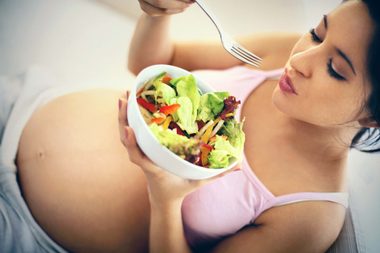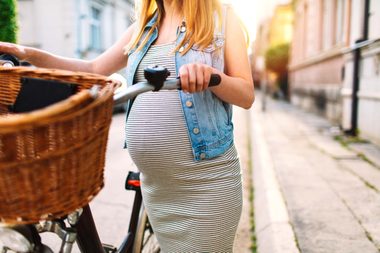
Morning sickness happens only in the morning
We had to tackle this one first, because well, for anyone that has had morning sickness, you know this one is a myth. Doctors believe morning sickness is a result of the increase of hormones in a woman’s body during pregnancy. And those hormones are present throughout the day, not only in the morning. For some women, the nausea associated with morning sickness can peak in the afternoon, while for others, it seems worse in the middle of the night. Like most things associated with pregnancy, every woman is different, and this applies to how well you’re able to keep your breakfast down too. Then again, nausea and vomiting could also be a sign of something more serious such as preeclampsia symptoms you may be ignoring.

Morning sickness indicates your baby’s sex
Sometimes it is said that women pregnant with boys experience less morning sickness than those carrying girls. Is this just one of the many pregnancy gender myths or is there truth behind it? As it turns out, it might not be a myth after all. The hormone linked to morning sickness (hCG) is found to be higher in women carrying girls. Although this is the case, this does not mean women pregnant with boys are off the hook; they can still experience morning sickness to the same degree. Morning sickness can be debilitating regardless of the sex of baby. Women who find it to be interfering with daily life to an extreme degree should talk to their doctor about ways to ease the condition, such as medication and safe home remedies.

A little alcohol won’t hurt anything
This is one of those pregnancy myths you shouldn’t take lightly. Some might argue the verdict is out on this issue, and a glass of wine won’t do any damage to an unborn fetus. However, the truth is that no amount of alcohol has been proven to be safe during pregnancy. Those who choose to drink while pregnant are risking low birth weight, preterm birth, and fetal alcohol syndrome. There is also the issue of the way an individual woman’s body may process alcohol. Each woman has varying amounts of an enzyme in her body tasked with breaking down alcohol. David Garry, DO, chair of the Fetal Alcohol Spectrum Disorders Task Force for the American College of Obstetricians and Gynecologists, told webmd.com, “If a pregnant woman with low levels of this enzyme drinks, her baby may be more susceptible to harm because the alcohol may circulate in her body for a longer period.” Bottom line: No amount of alcohol is safe, so it’s best to avoid it completely. Check out these surprising facts about fertility.

Wide hips make birth easier
For women with wide hips, one of the pregnancy myths they may have heard is that their ample hip width will benefit them during birth. Sadly, having “birthing hips” won’t make the birth experience any easier. What affects the ease of ability to give birth is actually the width of the pelvis, which has no correlation to width of hips. Smaller women often have the ability to birth larger babies, and larger women often have difficulty birthing smaller babies as the result of varying pelvic bone size.

Lifting your arms above your head will strangle the baby
This sounds a bit bizarre at first, but surprisingly, many women have been subject to urgent warnings not to raise their arms above their heads for fear of strangling the baby in the womb with the umbilical cord. The truth is a woman’s arm movements have no bearing on a fetus, as her arms are not in any way connected to the umbilical cord. Babies often tangle themselves in their umbilical cord with resulting harm. But for women concerned with this issue, they should mention their concern to their obstetrician for further reassurance. Go ahead and stretch those arms, ladies! Watch out for these everyday things that could be harming your fertility.

You need to eat for two
Don’t kill the messenger, but you probably don’t need that extra helping of fries with dinner, you know “for the baby.” While pregnancy does warrant an increase of about 300 calories per day in the second and third trimesters, there is no reason to double your portions at every meal. Increasing the nutritional value of your diet is, however, recommended, so make sure that you are eating food full of powerful nutrients that your body needs during pregnancy.

No coffee allowed
Pregnancy can be downright exhausting sometimes, so is caffeine completely banned for all nine months? The short answer is no, but you do need to make sure you’re not ingesting more than a cup (less than 12 ounces) of coffee per day. An adult is able to process caffeine, though a fetus is not, and it does cross the placenta. Caffeine is a stimulant, linked to increased heart rate, increased blood pressure, and dehydration, which become worrisome during pregnancy. It can alter the activity level of a fetus in the womb, as well as change the sleep cycle for an unborn baby. Be aware of other sources of caffeine that may be lurking in your diet since coffee and tea aren’t the only foods that contain the stimulant.

Lunch meat is not allowed
Pregnancy can often feel like it comes with a long list of restrictions that a woman must follow to keep her unborn baby safe. One of these commonly discussed restrictions is that a woman should avoid lunch meat, hot dogs, and soft cheeses during her pregnancy. This myth derives from the fear that she might contract listeria—and that’s a completely valid concern. Listeria is a bacteria that can cause miscarriage, still birth, newborn death, and disabilities of the baby, while only causing flu-like symptoms (if any) in the mother. Sometimes a woman has no symptoms at all, but passes the infection to the fetus unknowingly. The bacteria thrive at cold temperatures in unpasteurized food and can affect animals that may not show symptoms, resulting in the recommendation to avoid refrigerated meats and cheeses produced with them. If a woman chooses to eat lunch meat, deli meat, or hot dogs, they must be heated until steaming to avoid the possibility of infection. Unpasteurized milk and cheese is not recommended for a pregnant woman’s diet. These are surprising reasons you might not be getting pregnant.

Bump shape determines if it’s a boy or girl
“You’re carrying high, it must be a boy.””Your belly is so wide, it’s definitely a girl!” Sound familiar? People love to guess the sex of a baby based on nothing more than the way a mother’s baby bump looks. Do any of these predictions have merit? Nope. The shape of a woman’s stomach during pregnancy is a direct reflection of her body’s build and muscle tone with no correlation to whether the fetus is male or female.

Touching cats is not recommended
If you’re a cat person and pregnant, do not despair. Your feline family member need not be banished from your home. However, someone else needs to handle the litter box duties. This myth became perpetuated by the fact that cats spread toxoplasmosis, a parasite, in their feces. They contract the parasite by eating smaller animals such as mice that are infected with it. Although it is not recommended that pregnant women change the litter box, if it cannot be avoided, wearing gloves and then washing hands thoroughly with warm water and soap should take care of any associated risk. When gardening, gloves should be worn as well, and any fresh fruits or vegetables should be washed, peeled, and cooked thoroughly as outdoor cats often defecate in gardens and yards. Toxoplasmosis in cats can be avoided by only feeding your cat commercial wet or dry food and keeping your cat indoors only. Risks to a fetus that contracts toxoplasmosis in the womb include the development of blindness or mental impairment later in life.

Don’t exercise during pregnancy
Pregnancy can often make women feel more tired than usual, so if you’re not pumped to go to the gym as often as you were before, don’t worry. If you do decide to hit the gym, breathe easy because it’s perfectly safe for most women to continue to exercise as long as you listen to your body and don’t push yourself to get in a strenuous work out. Exercise during pregnancy should include light aerobic activity such as walking, and should always be cleared by your doctor prior to beginning any routine. Activities that involve physical contact or have a greater likelihood of falling should be avoided, and mothers with preexisting conditions during pregnancy such as asthma or diabetes should avoid physical activity or if advised to do so by their doctors.

Heartburn means more hair
For years women that complained of heartburn in late pregnancy were told that their baby would be born with a good amount of hair. Women were left to wonder whether this was one of the many heartburn during pregnancy myths, until a John Hopkins study proved it was true. The researchers found that there was indeed a correlation between the severity of heartburn in pregnant women and the amount of hair their babies were born with. If you’re popping antacids after every meal, you might want to pick up a few infant hair care items the next time you’re at the store. Next, learn some more things no one tells you about giving birth.
